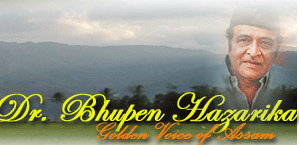MEANINGS FOR MILLIONS
July 29, 2008 – 11:56 amMEANINGS FOR MILLIONS
Bhupen Hazarika
The Question Mark
“Educate and inform the whole mass of the people. They are the only sure reliance for the preservation of our liberty” -warned Thomas Jefferson.
Lallu, the laborer in a Bombay wheat mill often wonders at a paradox of his times; why the sweat of his brow is not offering enough bread for his own children. Ramu, the farmer in Bengal examines a handful of soil and wonders how he should fight against erosion in his rice field, which was once so green! Osman, the skilled craftsman of Benares, whose golden sari decorations are bringing showers of admiration to many a sophisticated Indian princess in Paris and New York night clubs, wonders why he is unable to present an ordinary sari to his own daughter. The common man of India wants to know why he should vote this time for a particular rich gentleman whom he has seen only talking.
What are people’s responsibilities in a democracy? What are their rights? Why cannot he read the document that informs him of the confiscation of his property? What should he know as a responsible citizen to lead a decent human life? He has heard about a coming famine ‑ what should he know in order to end famine for ever? Inquisitiveness is natural to rational human beings, even to the unlettered ones. Education is helped by this natural enquiry in human minds, that comes as a result of the impact of the environment. One of the greatest roles of education is to facilitate free flow of ideas and meanÂings within the community, so that all the members can think its betterment. Can adult education be one of the solutions? Undoubtedly yes ‑ but it depends on what is taught.
The Content of learning
New India has a duty to bring to the understanding of the rural adult that he is a living member of the community. He must be acquainted with the forms of all the social, political, cultural institutions of society. A knowledge of the fact that the citizen is in a social environment whose laws bind him for the good of all must be awakened. Adult education should continually point not only towards active civic duty but also towards his civic rights, snatched away by vested interests of his own society. Civic education must be able to show the contradictions within him and the contradictions around him which create a decision and a conflict. When these conflicts in turn force him into new decision and a new conflict, only then may education be regarded as dynamic. Mere literacy does not always help. The educationists in Tagore, and Gandhi realized it fully. India’s problem of mass education is largely a rural problem because less than fifteen per cent of the people of India live in towns and cities as compared to fifty one per cent in the United States of America. Eighty five percent of India’s vast population are devoid of letters. Adult suffrage recognized by the Constitution of India without proper scope for adult education may very well be called a symbol without any meaning.
The Unhappy Remnant
The existing system of education ‑ a remnant of the British imposed one makes a sad commentary on the heart of free India. It has very little relationship
with the hopes aspirations and needs of the people. Indigeneous culture of the people is still neglected by the curriculum planners. The environment is not yet regarded as resources of education. Rigid and centralized administration kill local initiative.
Active participation in learning is hardly encouraged. The learning process centers around the outdated textbook, the teacher, and the bookish examinations that make self‑evaluation of the learner impossible. An Englishman once commented on the education of British India only a few years ago.
“If education is the transmission of life from the living, we do not know how to describe the system of teaching that prevails here. It is carrying death from the dead, through the dead to the dead.” (1)
In other words, it is a tyranny of formality. How can we blame an unlettered adult farmer of India today if he is scared of a ” formal education” in his mid‑ forties?
Meanings and Media
Dr. Hallenbeck mentions four types of circumstances in which educational experiences of adults occur: as the independent activity of the individual; in groups in relation to organized activities; in the community; and through the use of the media of mass communication. Of these the second and the third are of pre‑eminent importance, while the first and fourth are suppleÂmentary, gaining their significance from their relationship to the other two. (2)
The writer would touch a few pertinent thoughts on the fourth one i.e. mass communication media, by which millions can be reached. Success of the educational activity depends on the skillful use of proper techniques of communicating meanings to the masses. Technique of communicating ideas has developed durÂing this century as a corollary of progressive educational theory.
“Communication is a term that covers a vast and varied field of human action. The mere uttered sounds, the audible symbols that make some difference in the environment of a listener and thus, as we say, convey a meaning, are in themselves difficult phenomena.
When these audible symbols are represented by visual symbols such as the characters of a written language, complications arise. They are both psychological and sociological and they are bard to
understand. In spite of that, of course, we go on in naive self assurance doing what is necessary to live in community; we communicate.” (3) observes Dr. Lyman Bryson. The technological, scientific and psychological upsurge during our century has brought into everyday use a number of media the more significant of which are popular print, radio, recordings and motion picture. Motion picture perhaps is the most effective, because it is “able, more than any art to disclose the process that goes on microscopically in all other arts” (4) according to Sergei Eisenstein.
Maulana Azad observes that expansion of mind of the adult can be largely effected today through the use of scientific methods and machinery; he believes that there is experience of countries like Russia and the U.S.A. where open air drama, the film and the radio have been used to very great effect. Russia has in fact succeeded in carrying out her successive five‑year plans largely through the use of such scientific methods and machinery. We should benefit by the experience of these countries and draw upon the vast stores of educational films that have been built in Russia and the U.S.A. (5) Put what about our Indian film world which stands second to the U.S.A. in the field of production? The quality of some hardly rises to the minimum standard of the ridiculous. The producers of the so‑called “educational films” produce films without analyzing the maturity level of those for whom they are meant, or knowing the educational effect of it.
Bureaucracy and red tape in State‑controlled broadcasting system of India have snatched the initiative front the “programme planners”. The planners schedule programmes for rural listeners of the total population) without getting any scope to know and feel the people’s needs. Lay participation is neglected. In new China, the problem of scarcity of radio receiving sets has been greatly solved by “listening, societies” in worker and farmers’ organizations. This initiative from the masses comes only when they feel that the socio‑educational institutions belong to them and are used for them. In China, important news have been communicated to the rural masses by “living newspapers” in dramatic form. Because Mao‑Tse‑Tung is convinced that “those who cannot yet read want to see plays and look at pictures; they want to sing and hear music. They form the public for our literature and art”.(6) Bernard Shaw’s following remark can very well be used in the case of India ‑ “The number of people who can read is small, the number of people who can read to any purpose is much smaller, and the number who are too tired after a hard day’s work to read at all ‑ enormous. But all except the blind and deaf can see and hear.” (7) Experience, both vicarious and direct, makes learning permanent and fruitful. The problems of verbal symbols, radio, recordings, still pictures, motion pictures, exhibits, field trips, demonstrations, dramatic participation, role‑playing and contrived experiences on the one hand and direct purposeful experiences on the other meanings effectively to the adult learner. If India’s teeming millions are to learn and relearn while they work and hand, are in the domain of instructional materials and methods, which facilitate imparting of real meanings effectively to the adult learner. If India’s teeming millions are to learn and relearn while they work and rest, progressive theory of education for life must be practiced under a truly democratic administration. And for that, research workshops in administration, teaching technique, role of instructional materials and community projects for the beneÂfit of rural adults are of utmost importance.
Considering the emphasis in Gandhi’s Basic Education Scheme and Tagore’s rural education on observation and first‑hand experience, the importance of the use of audio‑‑visual methods (a development of mass communication theory) is evident. Because of the lack of funds, bad transportation, and the need for reaching large groups in a quick way, it is essential to discover ways and means by which education can be carried on through the use of mass comnunication media. Press, radio, films and educational institutions should act Lit u coordinated way for adult education drives. Since occupations and their teaching have been of great importance for the economic reconstruction of rural masses, it is in this very area of technique that modem materials and methods can be of most value. Since such programmes depend mainly on educators to work in it, this seems to be a particularly appropriate time to give pre‑service and in‑service education in mass communication techniques in the teacher training institutions of India. It will help to make education informal and interesting ‑ and enable the adult educators to carry out their programme during both the working and leisure hours of the masses. Active participation in all life situations would lead to better understanding of their occupations and to a fuller life. Behind all these lies the theory that communication of ideas should have an unbroken flow. The masses have a right to know ‑ and education should transmit the information for a social change and rejuvenation.
A Step Forward
Every State wants to draw attention of the people by education through mass communication media. Media being neutral, the ruling power might use them for either good or evil purposes.
The attention structure within a state writes Dr. Laswell of Yale University “is a valuable index of the degree of state integration. When the ruling classes fear the masses, the Rulers do not share their picture of reality with the rank and file. When the reality picture of kings, presidents and cabinets is not permitted to circulate through the State as a whole, the degree of discrepancy shows the extent to which the ruling groups assume that their power depends on distortion,” In a static state, education may be only for preservation of reaction and not a step forward.
(1) As quoted by Minoo Masani. in “Picture of a Plan’;
(2) UNESCO Publication, 1949. Article by Dr. W. C. Hallenbeck
“Methods and Techniques in Adult Education”. p. 80
(3) Lyman Bryson 2 The Communication of Ideas”‘. p. 1
(4) Sergei Eisenstein, “Film Form”. p. 5
(5) Maulana AzIad `Verbatim record of the Educational conference” New Delhi, 1948. p. 4
(6) Mao‑Tse tung “Problems of Art and Literature”. p. 11
(7) As quoted in “Fundamental Education”‘. Report of a special committee to the preparatory commission of UNESCO. p. 279
(8) Harold D. Lasswell “The Structure and Function of Communication in Society“, Communication of Ideas (edited by Bryson). P. 50.
This Article received from
Ananta Nath, P.E, D.WRE
Chief Engineer
South Florida Water Management District
Big Cypress Basin
2640 Golden Gate Parkway, Suite 205
Naples, FL 34105












